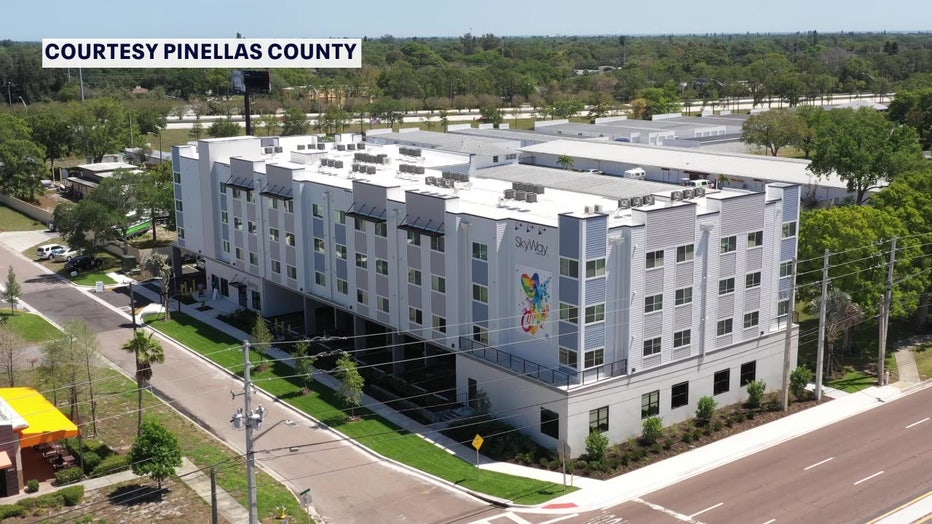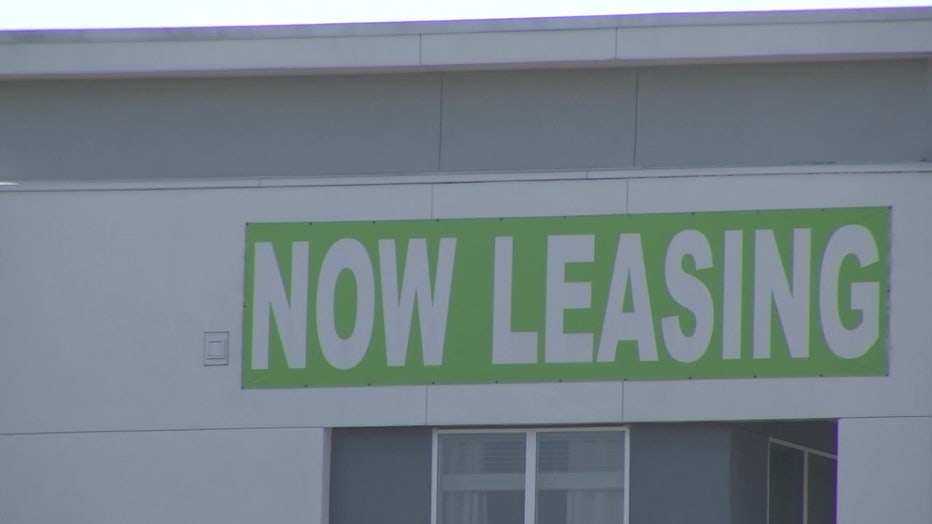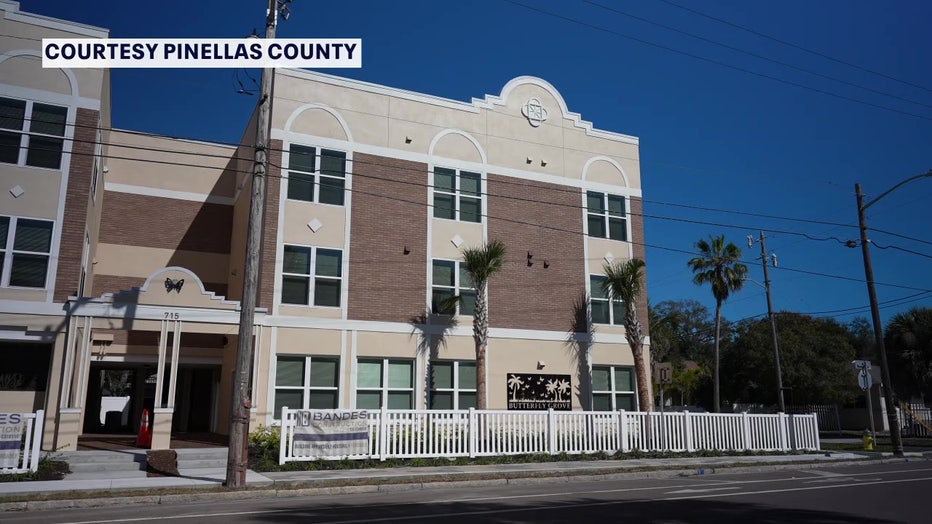St. Pete church affordable housing plan faces pushback from nearby neighbors
Neighbors questioning affordable housing plan
A St. Pete church wants to build affordable housing units on a vacant piece of property next door, but it's a plan that doesn't sit well with neighbors.
ST. PETERSBURG, Fla. - A plan submitted by a St. Pete church to build affordable housing units on its vacant piece of property isn’t sitting well with its neighbors.
Residents in the Disston Heights neighborhood have gathered close to 800 signatures on a petition opposing the plans.
Palm Lake Christian Church is partnering with Newstar Development, and has been talking about an affordable housing initiative for several years now, a representative from the church said in a recent Q & A with the community. They submitted a proposal to the city that the city council will review at its meeting Thursday.
The plan includes 86 units total. One three-story building would hold up to 72 units, and seven one-story buildings would have up to two units per building. The proposal says there would be 63 parking spaces and eight bike parking spots. It’s "intended to target seniors and/or persons with a disabling condition," the proposal says.
According to the proposal, 50 to 80 percent of the units are for residents who are permanently disabled. At least 20 percent of the units are for families who would otherwise be homeless. The three-story building would be for residents earning at or below 60 percent of the area median income.
RELATED: New rent-controlled apartments to tackle St. Pete affordable housing crisis
That’s $924 per month in rent for a one bedroom and $1,108 per month for a two bedroom, according to the developer.

The one-story buildings would be workforce housing for residents at or below 120 percent of the area median income.
Andrea Cate, the church’s board chair, said several years ago, a charter school approached them and wanted to buy the land to develop a high school.
"That wasn’t the direction that we wanted to go, but it did start a conversation questioning what would be a good use of the land," Cate said. "The church created a long-range planning committee to search for the community's greatest needs and how we could help serve those needs on our campus," she said.
Cate said her father served as a city council member and on several committees. She said initially, affordable housing wasn’t on their radar for the property, until a law passed in Florida in 2020 that speeds up affordable housing developments in areas where zoning doesn’t ordinarily allow it.
"Understanding the huge crisis that is being faced, along with rising cost of living, we realized that we could really make a difference," she said.
Neighbors, however, are concerned, because they said the church hasn’t been transparent with them.
"We’re just not quite clear who is intended to use this space," Nadine Copley, who lives nearby, said.
Copley also said she rents space from the church where she runs her wellness center. She said her neighbors told her about the project, not the church. She and others said it comes down to how "people with disabling conditions" is defined.
READ: Bay Area mayors struggle to balance booming market, affordable housing
"The issue has always been the lack of disclosure. That is the problem here. That’s the problem. No one has been given the option to really have an opinion of what’s being built here because no one really knows," Copley said.
"I have a different opinion if it’s for the elderly or the 55 plus or those with physical disabling conditions," she said. "I think that really it’s this lack of disclosure and the confusion of them telling us multiple different things on public forums," Copley said.
Other neighbors agreed.

"If they’re going to cater to the elderly or people with disabilities, if that’s what they state, then I’m ok with that, but when I hear people with disabling conditions and that is open to a wide range of people," Paul Weinberg, who lives next to the vacant property, said.
The church’s proposal sent to the city cites a state statute that defines a disabling condition as "diagnosable substance abuse disorder, serious mental illness, developmental disability, or chronic physical illness or disability."
Church leaders and the developer said the definition of disabling condition depends on the tax credit funding application.
"You have four options to choose from, and we have developed these communities before with the same funding source, and the one that we’ve discussed with the church is adult persons requiring independent living services in order to maintain housing or independent living skills and who have a disabling condition that currently impairs or is likely to impair physical mobility," Brian Evjen, President of Newstar Development, said.
"There is a separate and completely different funding application that addresses mental illness. It’s called developmental disabilities as opposed to disabling conditions and I know that’s a lot of detail, but that’s just the way that these developments are targeted, and so we have specifically targeted physical disabilities as opposed to mental disabilities mostly just because our management company has the capacity to manage that population and not the other population," Evjen said.
Neighbors said they’re not too sure they trust the church and the developer because they feel like they haven’t been transparent in the past.
"You say that today, but two years from today it might now be the same answer," neighbor Tammy Ingram said.
Evjen said they’ll verify applicants’ incomes, and screen them for felonies, violent crimes and previous financial or behavioral issues that may have led to eviction. He said a pre-approved property management firm will manage the community, not the church.

"These are residents who will be paying rent. They will be working, and I just think it’s unfortunate to attach a stigma to these residents like they will be living on the dole or not productive members of society," Enjen said.
Some neighbors said they worry for the safety of their families and of students at a nearby school depending on who may move in.
"Putting a facility for disabling conditions next door to an elementary school makes as much sense as putting a pot dispensary next to a high school," another neighbor, who didn’t want to give his name, said if the housing includes individuals with "diagnosable substance abuse disorder and serious mental illness."
Neighbor Scott Osborn agreed.
"It’s totally unreasonable when we’re trying to do every reasonable thing we can to make schools a safer place to try to have this kind of project right next to the school," he said.
"I am a mother of four and a grandmother of five," Ingram said. "We have an elementary school that has three-year-old pre-K right up against the property. We already have a traffic problem. I have seen children almost get hit on the street that backs up right in front of the church and in front of the school and by adding a population of 200 plus to this small property here is going to add to that problem," she said.
Neighbors also said they’re concerned the units won’t fit in with their neighborhood.
"The type of housing that they’re trying to develop here does not fit into our area of single homes and the amount of people that it may bring will also be of concern," Silvia Paredes, who has lived in the neighborhood for decades, said.
According to the church’s plan, a detailed traffic study found there wouldn’t be a significant impact to traffic patterns.
City staff recommended the project for approval. Staff also noted in the council’s agenda that they’ve received several emails and phone calls about the project. There will be a public hearing about the topic at Thursday’s city council meeting. The public hearing starts at five p.m. at Council Chambers in St. Petersburg’s City Hall.

